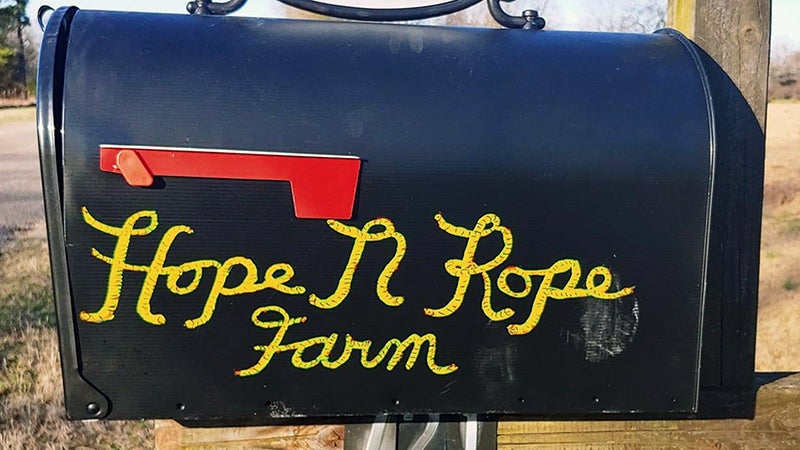Orrville farm prepares to plant first hemp crop
Published 4:36 pm Thursday, April 25, 2019
The Alabama Department of Agriculture and Industry (ADAI) recently announced the names of more than 200 operations, including farms and universities, that received licenses to grow, cultivate, research or process hemp in the state.
Hemp is the non-psychoactive sister of marijuana used for manufacturing industrial products, such as cloth and paper, and creating medical products, such as cannabidiol, also known as CBD oil, that has proven effective in alleviating suffering from seizures, anxiety and a number of other medical issues.
Among the seven operations in Dallas County that were approved for growing hemp, and four others approved for processing the plant, was Hope N Rope Farms in Orrville, which was approved for both.
“We believe in all the aspects of hemp that can help our planet maintain, both environmentally and health-wise,” said Jeff Sloop, owner of the Orrville farm. “We believe in the good it can do for our country and the world in general.”
Sloop is a native of Wisconsin and has spent the last two decades living in Denver, where a friend maintained a hemp farm and kept him abreast of the processes on the farm and the results the yields produced.
After some encouragement, Sloop decided to get into the hemp farming business as a way of helping people.
“That’s really what our main focus is on,” Sloop said. “That’s why we got into it. We’re not farmers by trade.”
Sloop found the property in Orrville, having been familiar with Alabama since his family moved to Baldwin County two decades ago, and jumped at the opportunity – the farm was purchased in December and planting is slated to begin next week.
“We took a pretty big risk,” Sloop said. “We bought the farm before the Farm Bill even passed. We felt so confident that it was going to pass and we felt like we had to take the risk.”
Hope N Rope Farms will be dedicated entirely to growing hemp, with Sloop planning to plant 40 acres this year and expanding up to at least 80 acres in the coming growing seasons.
Seeds will be started in the farm’s greenhouse next week and after three to four weeks will be transplanted into the nearby field where they will stay until harvesting time, which should be around the beginning of September.
“We’re getting a little bit of a later start than we would have liked,” Sloop said.
If everything goes according to plan, Sloop hopes to see his field produce as much as 100,000 pounds of hemp this year.
“There’s a lot of numbers out there that kind of bounce around,” Sloop said. “There’s just so many variables. You can go through a number of different things that might hurt our yield, but each plant should create about a pound each.”
Sloop plans to sell the crop to a processor, where it will be turned into CBD oil and distributed to needy patients across the nation, but says he got the processing license just in case – his friend from Colorado, who has been helping him through the process, runs a mobile processing plant that Sloop might utilize in the future.
His grand vision for the farm includes creating his own seed strain and growing a farm full of crops from that strain and then processing the crop and selling his own CBD oil brand.
“Right now, that’s almost impossible to do,” Sloop said.
For his part, Sloop sees the hemp industry as a pioneering trek into the past and future, as well as a public relations effort aimed at educating the public on the difference between hemp and marijuana.
“It’s an old way of farming,” Sloop said “Realistically, if you think about it, all of us hemp farmers are going back 80 years, we’re really stepping back in time and farming it the old-fashioned way. There’s going to be a kind of revolution in farming equipment in the next year or two as we begin to see what we need.”
Sloop believes this new industry will do for the modern farmer what tobacco did for farmers during the 1930s, saying that small farmers were able to grow a small plot of tobacco 70 years ago and make a good living.
“I think you’ll see, over the next year and over the next five years, the number of people getting into hemp farming quadruple,” Sloop said. “The need is there, there’s plenty of demand for the product. Hemp farming will bring the small farmer back into a profitable farming situation.”
But Sloop acknowledges that hemp farmers in Alabama have an uphill battle convincing the public that hemp is not a mind-altering drug.
“We’re trying to educate everybody that hemp is not marijuana,” Sloop said. “You have no idea the number of people who think we’re marijuana farmers. We want nothing to do with marijuana.”
More than industry building or running a profitable hemp farm, Sloop is interested in providing “high-quality” CBD oil to people suffering across the country.
“Those are all things we’re really passionate about, helping people have a healthy life without taking a bunch of pharmaceuticals,” Sloop said. “I’m hoping it pays off and we get to help a lot of people.”






